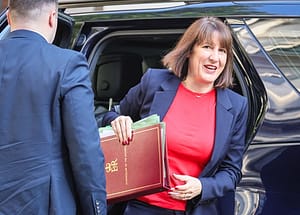Almost 1.8 million UK savers are paying tax on interest earned from banks and building societies, as rising interest rates and frozen tax thresholds combine to punish those with cash savings.
The data, obtained by investment platform AJ Bell, reveals a huge leap last year in the number of people hit with a tax bill on cash savings interest. Figures obtained following an FOI request to HMRC show that, in the tax year ended this April, the number of savers snared rocketed 82% to 1.77 million.
Despite cash savings losing value in real terms, with the best savings rates still lagging well behind inflation, taxpayers owed HMRC over £3.4bn in tax on money earned through cash accounts last year.
It means the average bill incurred by someone stung with tax on cash savings amounted to almost £2,000, although this is likely skewed higher by some wealthy individuals paying large tax bills if they hold considerable sums in cash.
The figures could yet worsen, with more people likely to be caught as interest rates rise and the personal savings allowance remains frozen. The government is expected to land a mammoth £6.6bn tax take this year, with even more savers likely to be affected.
Tax bills on cash interest exceeding the personal savings allowance are paid either through self-assessment, or deducted from income through a tax code adjustment. Many won’t have been aware they owed tax on cash savings interest and will unexpectedly find their tax code changed to deduct the money from their payslip.
AJ Bell is calling on the Chancellor to end the freeze on the personal savings allowance, which has been set at the same level since 2016. Alongside recent rate rises, the freeze means even those with prudent rainy day savings are being hit with tax penalties.
The personal savings allowance currently stands at £1,000 and £500 for basic rate and higher rate taxpayers respectively. Additional rate taxpayers get no tax break, meaning those with income over £125,140 now pay 45% tax on any cash interest outside an ISA.
With cash interest rates now above 5% on some accounts individuals with as little as £10,000-£20,000 in cash can expect to be impacted. AJ Bell believes nobody should be punished for holding a rainy day savings pot, and doubling the personal savings allowance would ensure households aren’t taxed on cash savings up to £20,000*.
AJ Bell head of personal finance, Laura Suter, says:
“Nobody should be punished for holding a rainy day savings pot, and doubling the personal savings allowance would ensure households aren’t taxed on cash savings up to £20,000, based on current rates.
“Rising rates and a frozen personal savings allowance means some individuals are being taxed despite having relatively modest pots of cash set aside for a rainy day. With cash interest rates now above 5% in some cases individuals with between £10,000 and £20,000 in cash can expect to pay tax on their savings interest. To add insult to injury, because inflation is so high, they aren’t even making a real return on their money – yet they are still being taxed.
“Until a brown letter lands on their doormat some people won’t even realise they owe tax on cash interest. Those filling out a self-assessment tax return will declare any savings interest, and subsequent tax due. But, for those taxed under PAYE, HMRC will calculate any tax due based on information sent to them by banks and building societies. It means many taxpayers will find there is a deduction made from their payslip each month, often before they’ve even realised they owe any money to the taxman.”




Leave a Comment